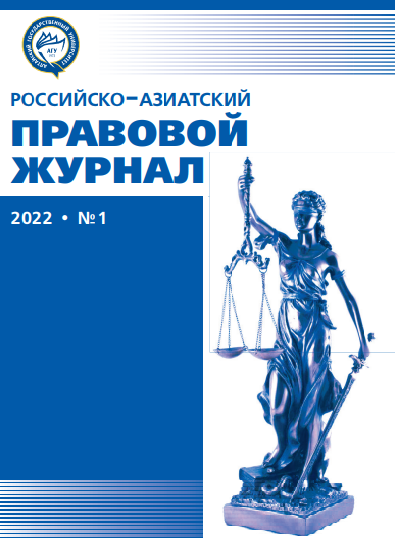JUDICIAL PRACTICE IN THE SYSTEM OF LAW INSTITUTIONALIZATION
УДК 347.9 ББК 67.71
Abstract
The article considers the issue of judicial practice in the context of ways of institutionalization of law.The methodological basis of the study is an institutional approach to defining the essence of positive law. Law,as a special social institution, must be considered as a unity of value-normative principles (ideas, principles,legal norms) and sustainable forms of social communication in the field of legal regulation, includingorganizations and institutions. It is substantiated that the sign of the formal certainty of law is manifestednot only in the presence of official ways of fixing and expressing legal norms, but also in the activitiesof state bodies (including judicial ones) that implement the application of legal norms and their officialinterpretation. Proceeding from this, two forms of institutionalization of positive law are distinguished —normative and organizational, and the spheres, relatively speaking, of “regulatory law” and “judiciallaw”. This division is based on the cognitively and practically valuable interpretation of S.S. Alekseev thedifference between normative and individual legal regulation. It is concluded that in the mechanism of legalregulation, each source of law implements the corresponding function, which implies the recognition ofpluralism (diversity) of sources of law.
Downloads
References
Бурдье П. Начала. М.: Socio-Logos, 1994.
Лавриненко В.Н. Социология. М.: ЮНИТИ-ДАНА, 2005.
Барак А. Судейское усмотрение. М.: НОРМА, 1999.
Алексеев С.С. Проблемы теории права: Курс лекций: в 2т. Т. 1. Свердловск: СЮИ, 1982.
Дигесты Юстиниана. Избр. фрагменты. М.: Наука, 1984.
Бахтин М.М. Эстетика словесного творчества. М.: Искусство, 1986.
Гадамер Г. Истина и метод: основы философской герменевтики. М., Прогресс, 1988.
Власенко Н.А., Назаренко Т.Н. Неопределенность в праве: понятие и формы // Государство и право. 2007. №6. С. 5–12.
Семпсон А. Новая анатомия Британии. М.: Прогресс, 1975.
Кокотов А.Н. Доверие. Недоверие. Право. М.: Юрист, 2004.
Баранов В.М. Технико-юридические проблемы формирования и реализации правовых позиций высших судебных инстанций современной России // Судебное правоприменение: проблемы теории и практики / Ред.В. М. Сырых. М.: РАП, 2007. С. 170–181.
Russian-Asian Law Journal is a golden publisher, as we allow self-archiving, but most importantly we are fully transparent about your rights.
Authors may present and discuss their findings ahead of publication: at scientific conferences, on preprint servers, in public databases, and in blogs, wikis, tweets, and other informal communication channels.
Russian-Asian Law Journal allows authors to deposit manuscripts (currently under review or those for intended submission) in non-commercial, pre-print servers such as ArXiv.
Authors who publish with this journal agree to the following terms:
- Authors retain copyright and grant the journal right of first publication with the work simultaneously licensed under a Creative Commons Attribution License that allows others to share the work with an acknowledgement of the work's authorship and initial publication in this journal.
- Authors are able to enter into separate, additional contractual arrangements for the non-exclusive distribution of the journal's published version of the work (e.g., post it to an institutional repository or publish it in a book), with an acknowledgement of its initial publication in this journal.
- Authors are permitted and encouraged to post their work online (e.g., in institutional repositories or on their website) prior to and during the submission process, as it can lead to productive exchanges, as well as earlier and greater citation of published work (See The Effect of Open Access).








